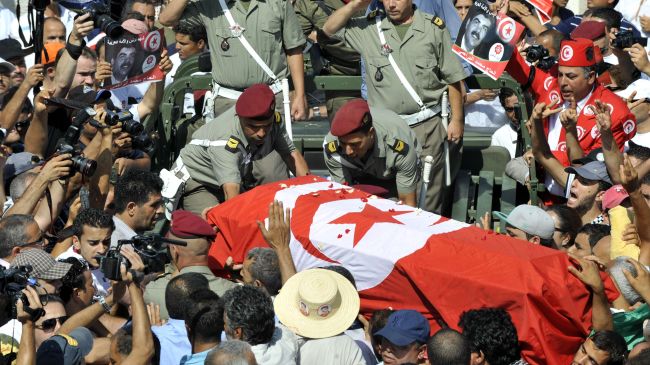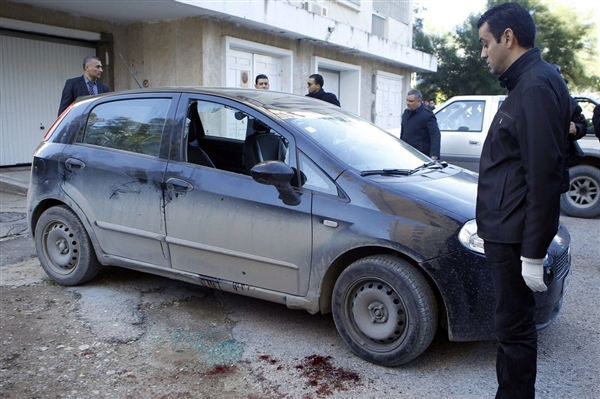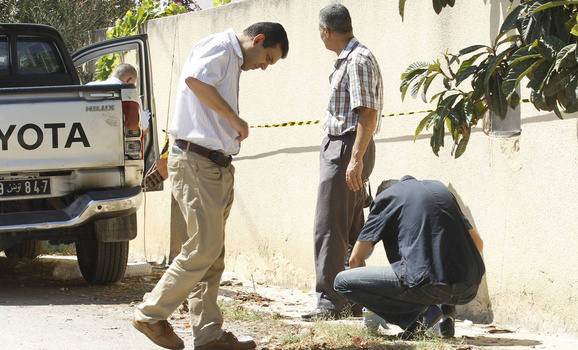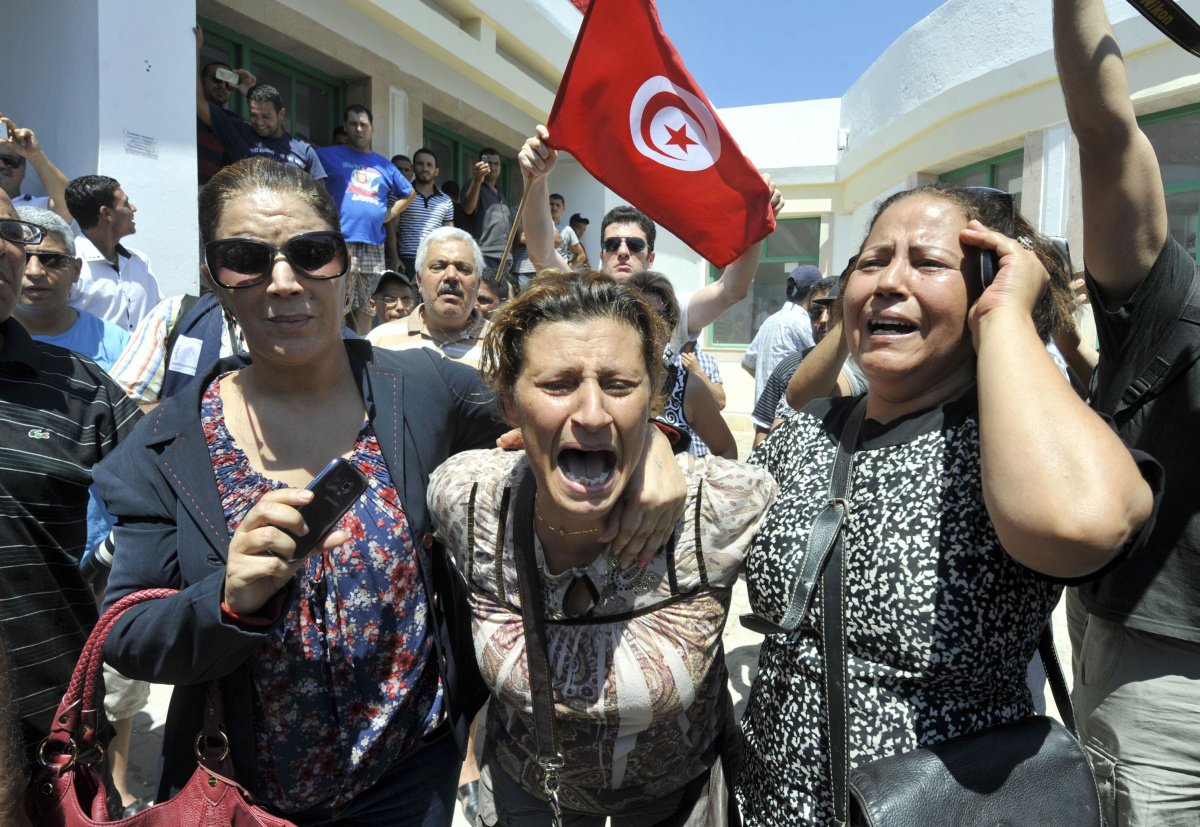

Tunisian soldiers salute as they load the coffin of assassinated opposition leader Mohamed Brahmi during his funeral procession in Tunis on July 27.
By Genevieve Theodorakis | The AfricaPaper
Tunisia’s second high-profile political assassination highlights the gravest shortcoming of the nascent Islamist government: the inability to contain the violence that increasingly threatens Tunisia’s fragile transition  – a violence set to divide loyalties and destroy social cohesion, foreclosing any prospects of a viable democracy or a stable society.

Shot 11 Times
On Thursday morning, fifty-eight year old Mohammed Brahmi was shot 11 times outside his home in front of his daughter and his wife in Tunis. Constituting the second high-profile political killing this year, Brahmi was a secular opposition leader and a member of Tunisia’s National Constituent Assembly, the body responsible for writing the constitution. Brahmi’s death is the latest in a string of violent acts committed against government critics in the last year. Crimes include physical attacks on secular politicians and journalists, the lynching of politician Lotfi Nagdh in October 2012, and the assassination of fellow opposition leader Chokri Belaid in early February 2013. The latter event triggered nationwide protests both for and against Ennahda’s rule, nearly destabilising the government in the process.
Suspicions
As in the case of Belaid’s murder, many Tunisians critical of the Islamist regime believe that Ennahda was responsible for ordering the assassination of Brahmi. Suspicions will likely be raised over the participation of the League for the Protection of the Revolution, a group that portrays itself as a bastion against former Ben Ali supporters, but which has been implicated in numerous incidences involving verbal and physical attacks against Ennahda’s opponents. Indeed, among some circles, the League is perceived as the militant hand of the Islamist party, suppressing ‘subversive’ anti-regime elements in society. A list of suspects will also likely include members of radical Salafist groups that have been empowered by Ennahda’s rule and are alleged to have committed violent acts such as the 2012 attack on the US Embassy in Tunis.
 Systematic Violence

While not all Tunisians directly fault Ennahda for Brahmi’s death, many others indirectly blame the party for failing to dispel the pervasive “climate of systematic violence†in the country. Specifically, the party is criticised for its inability to protect its citizens from verbal and physical harm and to ensure that the perpetrators of intimidating or violent crimes are checked and brought to justice. Within this, government critics assert that Ennahda has enabled extremist individuals and groups to act with impunity, exemplified by numerous accounts of harassment and assaults on opposition politicians. Indeed, in July 2012, several religious leaders openly called for the assassination of Tunisians critical of Ennahda, seemingly without consequences.
Risk
As in neighbouring Egypt, politically-inspired violence can most probably only further delegitimise Tunisia’s current political organisation, due to the state’s inability or unwillingness to protect the basic components to a democracy; most notably, the rights of the opposition. Nevertheless, Brahmi’s death presents a crucial opportunity for Ennahda to restore its legitimacy, which ultimately lies in its ability to restore law and order and enshrine the right of all Tunisians to speak freely without risk of verbal or physical intimidation.
Increasingly Polarised

An important step has already been made in this direction following a statement of Ennahda’s party leader, Rachid al-Ghannouchi, which declared the assassination a “crime against the democratic transition†and called on all parties to show “responsibility and restraint at this sensitive timeâ€. However, strong words will need to be supported by strong actions. Arguably the only way for Ennahda to restore its legitimacy in the eyes of many Tunisians is to bring justice to Brahmi’s family and supporters and to other victims of political violence, while implementing political and regulatory protections to ensure that freedom of expression is enjoyed by all Tunisians, without fear of verbal or physical retribution. Similarly, calls for violence against individuals critical of Ennahda or any other group may not be tolerated and must be dealt with objectively and rationally, irrespective of political affiliations with the ruling regime. Thus far, such actions have not yet been implemented. Yet without them, Tunisia risks evolving towards an increasingly polarised society divided along secular and religious convictions, with grave consequences for a peaceful and democratic future.
Blocking Roads
Like Egypt, government-inspired frustrations following Brahmi’s death have manifested themselves in violence on the streets, as reports flood in of protestors blocking roads, setting tyres alight, and attacking government buildings and Ennahda offices, while others gathered outside of the hospital where Brahmi died, chanting “Down with the rule of the Islamistsâ€.
The assassination has also prompted the cancellation of all flights to and from Tunisia on Friday as part of a general strike in protest of Brahmi’s death. Such actions may well exacerbate the growing rift between Islamist supporters and citizens disillusioned with the ruling regime, paving a similar route to that of Egypt’s side-lined and divided democracy.
“Tammarodâ€, or “Rebellionâ€
Indeed, individuals inspired by Egypt’s “Tammarodâ€, or “Rebellion†group that aided the overthrow of Islamist president Mohamed Morsi have already called for mass protests to demand the dissolution of the Tunisian parliament. Yet arguably the more worrying precedent lies with neighbouring Algeria, where a military coup thwarted a potential Islamist electoral victory in 1991 and triggered a decade-long civil war. Responsible for an estimated 200,000 deaths, the Algerian civil war serves as a cautionary tale to the dangers of societal polarisation between religion and secularism.

Fortunately, Tunisia has yet to reach this moment. Nevertheless, as a recent editorial from Le Monde warned, “Thursday, it was not just a man who fell. It was Tunisian democracy and pluralism that have been targetedâ€. Tunisia’s government has a unique opportunity to pull its country back from the precipice; without significant action, the nation’s first democratically elected regime may unleash the forces that could end its democratic experiment for the current generation. TAP
The AfricaPaper: Our special thanks to Genevieve Theodorakis for this article. Genevieve Theodorakis graduated from the LSE in December 2012 with an MSc in Global Politics, specializing in the Political Economy of the Middle East and North Africa. She currently works as an analyst for a global publishing company with a focus on the Middle East and Francophone Africa.







































